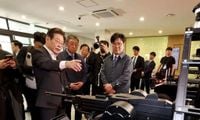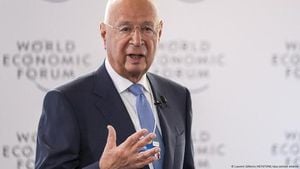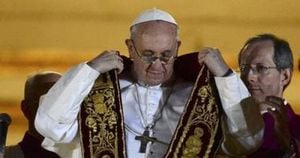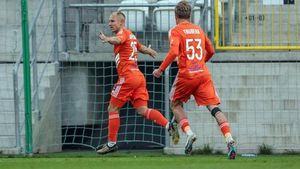On April 17, 2025, Lee Jae-myung, a prominent candidate in the Democratic Party's presidential primary, announced a significant shift in energy policy, advocating for an 'energy mix' strategy that includes investments in both nuclear power and renewable energy sources. This approach marks a departure from the previous administration's 'de-nuclearization' agenda, which aimed to phase out nuclear energy entirely by 2082.
According to sources within the Democratic Party, Lee's campaign is preparing to unveil this energy policy as a major pledge linked to his ambitious proposal to invest 100 trillion won in artificial intelligence (AI). "The party recognizes that renewable energy alone cannot meet the burgeoning power demands of the AI industry," stated one party official. This acknowledgment has led to a consensus that reducing reliance on nuclear energy is not feasible.
The proposed 'energy mix' policy will maintain nuclear power as a key component of South Korea's energy portfolio, contrasting sharply with the Moon Jae-in administration's stance. Lee's camp has indicated that they are open to extending the operational lifespan of existing nuclear plants, provided that safety standards are met. "If we are going to operate existing nuclear plants, we should consider extending their lifespan if safety is guaranteed," a representative from Lee's team explained.
On April 14, Lee pledged to create a national AI data integration cluster and to secure at least 50,000 graphics processing units (GPUs) to support this initiative. The expectation is that these developments will significantly increase power consumption, necessitating a robust energy policy that includes both nuclear and renewable sources. If finalized, this policy could align with the current administration's plans to add two new nuclear reactors as part of its energy strategy.
Yoo Jong-il, co-representative of Lee's advisory group 'Growth and Integration', emphasized the need for a reasonable energy mix, stating, "We need to approach energy policy fundamentally differently from the past, incorporating both nuclear and renewable energy solutions." This sentiment was echoed by Lee Un-ju, a Supreme Council member, who highlighted advancements in nuclear technology, including small modular reactors (SMR) and nuclear fusion, during a forum at the Korea Atomic Energy Research Institute.
However, as of April 18, 2025, the Democratic Party has yet to finalize its presidential campaign pledges. Jin Sung-joon, chairman of the Policy Committee, confirmed that all proposals are still under review.
In a related development, on April 18, Lee Jae-myung visited Daegu, where he presented his vision of transforming South Korea into a 'Global Soft Power Big5' cultural powerhouse. During a luncheon with webtoon creators and executives from major companies like Netflix, Naver Webtoon, and Kakao Entertainment, he articulated the importance of cultural content as a vital resource that influences a nation's soft power, job creation, and tourism.
Lee remarked, "Cultural content has transitioned from mere entertainment to a crucial determinant of a nation's soft power. True power lies in culture, which fosters respect and inclusivity among people." He stressed the government's role in enhancing the living standards of cultural and artistic professionals, advocating for a significant increase in the cultural budget to support the development of the arts as a core industry.
He further pledged to achieve a market size of 300 trillion won and cultural exports of 50 trillion won by 2030, emphasizing the need for a thriving cultural ecosystem. The visit to Daegu is particularly strategic, as it is a region where the Democratic Party has struggled to gain support.
In addition to his cultural initiatives, Lee also outlined regional development plans that include establishing a secondary battery industry belt and a future-oriented automobile parts cluster in Daegu and Gyeongbuk, as well as relocating the Ministry of Oceans and Fisheries to Busan and Gyeongnam.
Lee's recent engagements in Daegu and Daejeon reflect a broader strategy to connect with voters in traditionally conservative areas, a crucial move as he prepares for the upcoming primary debates. On the evening of April 18, he participated in the first live broadcast debate alongside fellow candidates Kim Kyung-soo and Kim Dong-yeon, with both of his opponents focusing on preparation for the televised event.
This combination of energy policy reform and cultural investment illustrates Lee Jae-myung's attempt to broaden his appeal and redefine the Democratic Party's platform as it heads into the presidential election. As he seeks to balance innovation with traditional energy sources, his proposals will likely shape the future of South Korea's energy landscape and cultural identity.

![[단독]](https://thumbor.evrimagaci.org/yR_YqhSZJYjErDEkyIUHUEwZ_80=/200x0/tpg%2Fsources%2Fd8e8fbd7-07f9-4545-9138-cd9f3a3affbb.jpeg)



